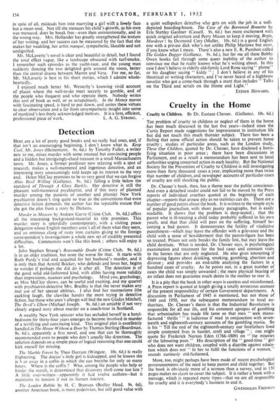Detection
HERE are a lot of pretty good books and no really bad ones, and, if that isn't an encouraging beginning, I don't know what is. Keep Cool, Mr. Jones (Heinemann. 9s. 6d.) by Timothy Fuller, a writer new to me, mixes murder with some unusual but convincing people and a hidden but intriguingly-clued treasure in a small Massachusetts town. Mr. Jones, a former professor now relaxing with a spot of research, makes a well-mannered and ingenious detective, and an interesting story unassumingly told keeps up its interest to the very end. Helen McCloy promises to be so very good that we can forgive Alias Basil Willing (Gollancz. 9s. 6d.) falling a little below the standard of Through A Glass Darkly. Her detective is still the pleasant well-mannered psychiatrist, and if this story of planned murder among the patients of another and phonier New York psychiatrist doesn't ring quite so true as the conventions-that even detective fiction demands, the author has the reputable excuse that she got the plot from a story by Dickens.
Murder in Moscow by Andrew Garve (Crime Club. 9s. 6d.) offers all the interesting background-material its title promises. This murder story is splendidly contemporary, with a visiting peace delegation whose English members aren't all of them what they seem, and an ominous clang of rusty iron curtains giving to the foreign correspondent's investigations a whole new set of credibly presented difficulties. Communists won't like this book ; others will enjoy it a lot.
John Stephen Strang's Reasonable Doubt (Crime Club. 9s. 6d.) is in an older tradition, but none the worse for that. It starts with Ruth Purdy's trial and acquittal for her husband's murder, and it is only then that Arnold Bricker, who defends and loves her, begins to wonder if perhaps she did do it after all. The detection is of the good solid old-fashioned kind, with alibis having more validity than impressions, nuances and psychology. Mind you, psychology, as Miss McCloy shows, can be useful and exciting, and my quarrel with psychiatrist-detective Mrs. Bradley is that she never 'makes any real use of her special abilities. I also find her mannerisms (the cackling laugh, the clawlike hands) the most trying in detective fiction, but those who aren't allergic will find the new Gladys Mitchell, The Devil's Elbow (Michael Joseph. 9s. 6d.) an amiable if not very closely argued story about murder on a coach-tour in Scotland.
A wealthy New York spinster who has secluded herself in a hotel- bedroom for thirty-four years emerges to become involved in murder of a terrifying and convincing kind. This original plot is excellently handled in The House Withma a Door by Thomas Sterling (Boardman. 9s. 6d.), apparently a first novel, and one that can be thoroughly recommended even to people who don't usually like detection. The solution depends on a simple piece of logical reasoning that one could kick oneself for missing.
The Marble Forest by Theo Durrant (Wingate. 10s. 6d.) is really frightening. The doctor's little girl is kidnapped, and he knows she is s .ut away in a coffin in which she can breathe for only so many hours. Where is the coffin ? Who, among the people who help or hinder the search, is determined that discovery shall come too late ? A little over-written--apparently it had twelve authors—but it maintains its tension if not its human interest.
The Leaden Bubble by H. C. Branson (Bad icy Head. 9s. 6d), another American book, is more pedestrian, but still good value with a quiet wellspoken detective who gets on with the job in a well- depicted boarding-house. The Case of the Borrowed Brunette by Erie Stanley Gardner (Cassell. 9s. 6d.) has more excitement with quick original adventure and Perry Mason to keep it moving. Begin, Murderer I by Desmond Cory (Muller. 10s. 6d.) is a good English one with a private dick who's not unlike Philip Marlowe but nicer, if you know what I mean. There's also a new E. R. Punshon called The Golden Dagger (Gollancz. 95. 6d.), but for me all these Bobby Owen books fail through some queer inability of the author to convince me that he really knows what he's writing about. In this case I don't believe in elderly old-family Lord Rone saying' phone" or his daughter saying " kiddy " ; I don't believe in any of his theatrical or writing characters, and I've never heard of a highbrow novelist who got a come-back through a stunt that includes" Talks on the Third and serials on the Home and Light."
ESTHER HOWARD.


































 Previous page
Previous page